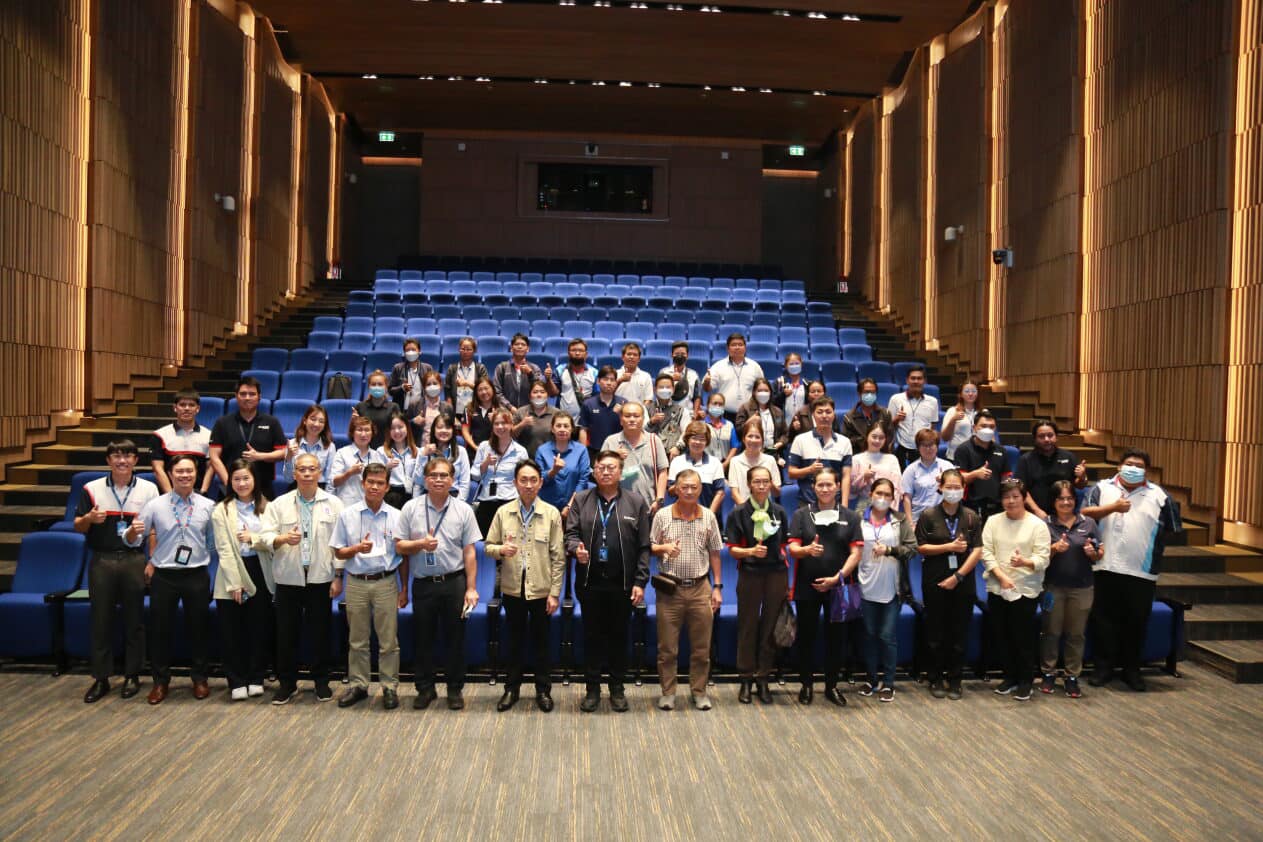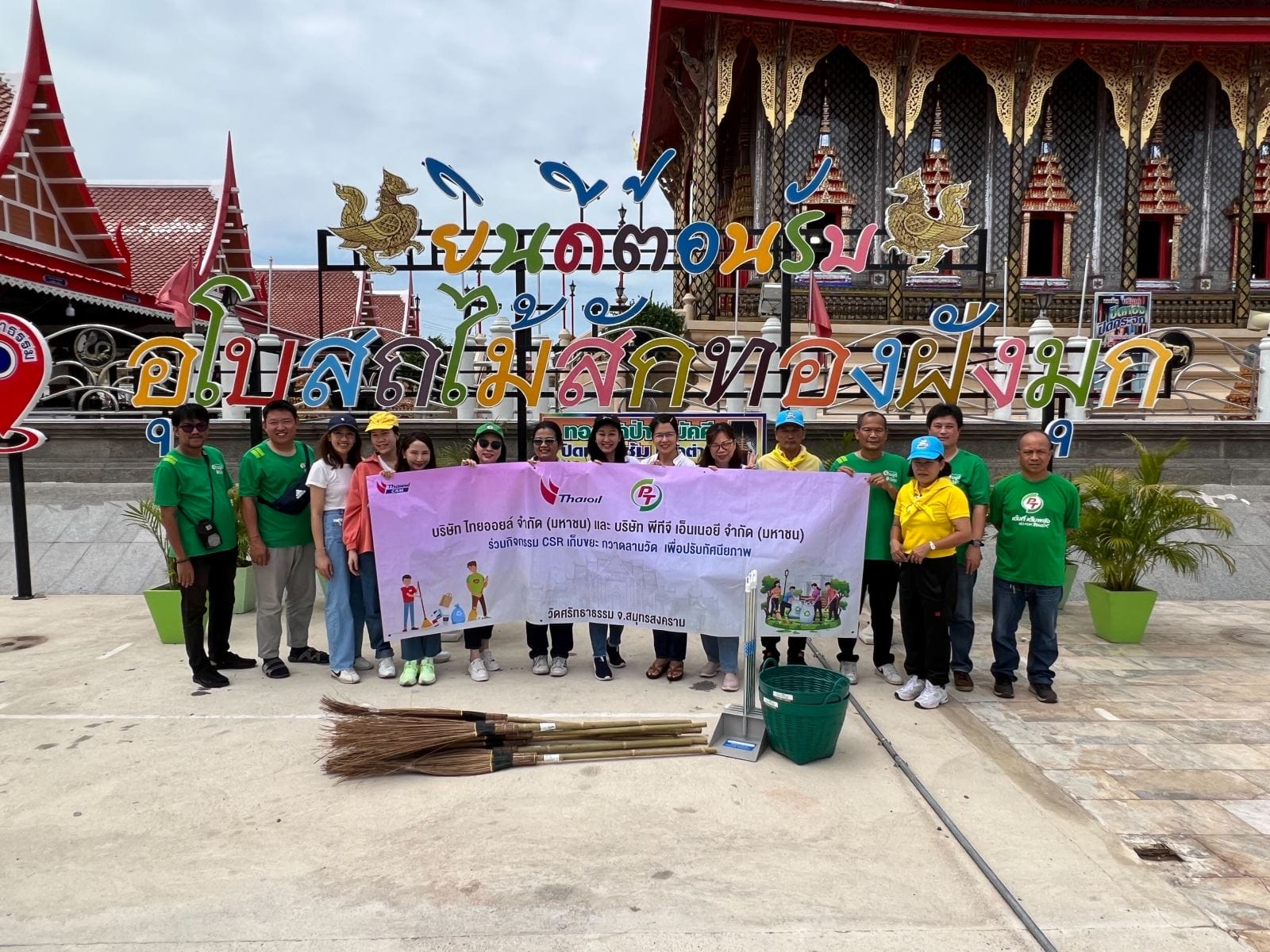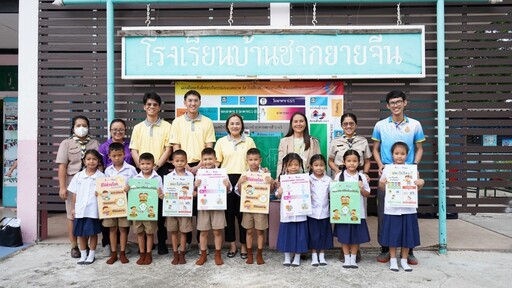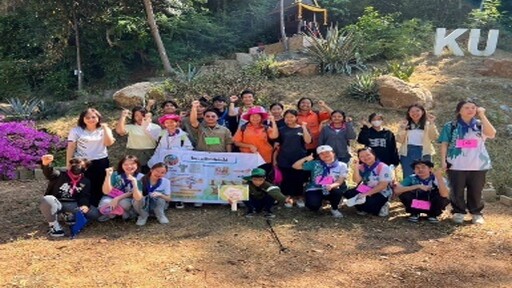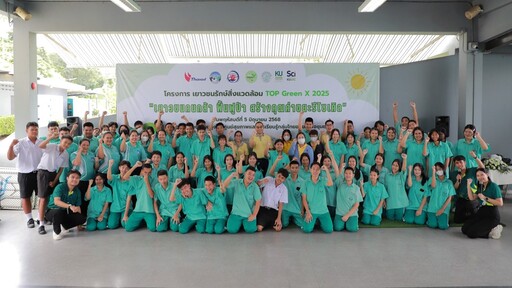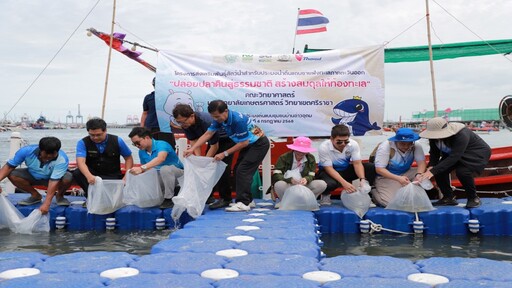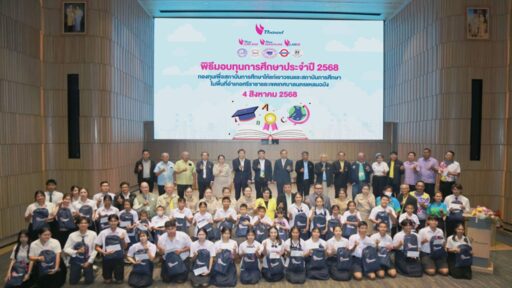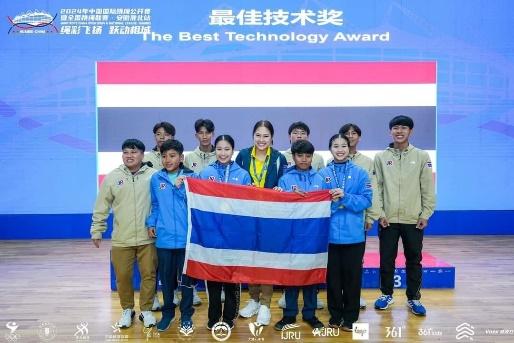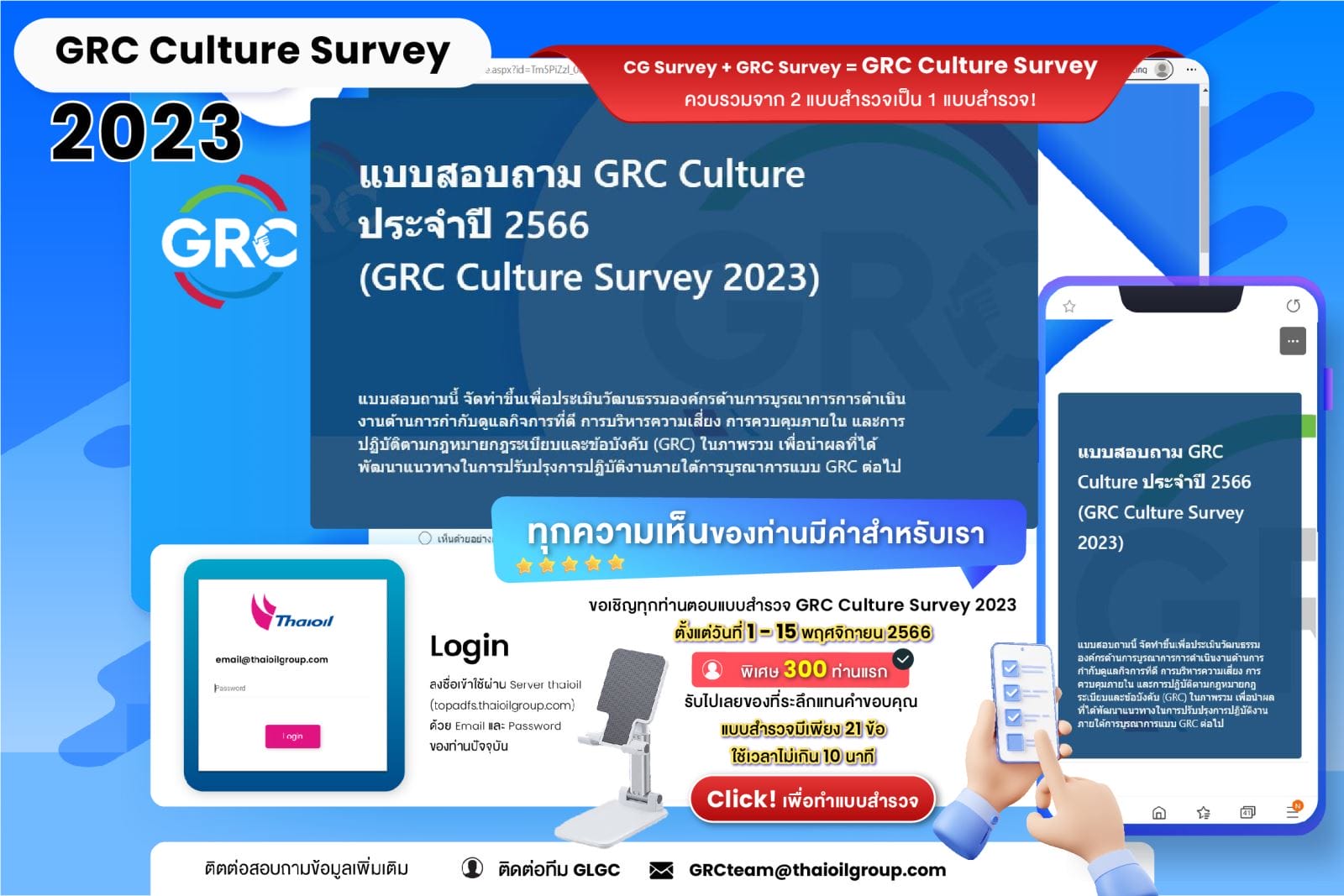Sustainable Supply Chain Management
Strategic Direction
Thaioil Group’s procurement prioritizes sustainable supply chain management due to its involvement with a large number of domestic and international suppliers.
This necessitates considering both the opportunities and potential impacts on environmental, social, and governance (ESG) factors, which are crucial for the continuity of business operations.

1.COMMIT
Thaioil Group is committed to implementing sustainable procurement practices aligned with the Thaioil Group sustainability management structure. This structure integrates economic, environmental, social, and governance (ESG) considerations throughout business operations, while adhering to procurement principles of transparency, fairness, and professionalism. Ultimately, these efforts aim to position the procurement process as a strategic driver of Thaioil Group’s success, aligning with international standards for sustainable procurement (ISO 20400 : Sustainable Procurement).

Thai Oil Public Company Limited is the first refinery in Thailand to be certified with sustainable procurement guidelines, namely
ISO 20400: Sustainable Procurement, which covers all non-crude oil procurement products and services
certified by the Management System Certification Institute (Thailand) (MASCI).

2023

2020
Development of Suppliers in Accordance with Thaioil Group's Sustainable Practices (Sustainable Code of Conduct for Suppliers of Thaioil Group: SCOC) Since 2015, all new suppliers registering through the system are required to accept the SCOC, and their adherence is monitored. To promote continuous improvement, Thaioil Group encourages the adoption of the SCOC by all suppliers, communicating it through the website and annual supplier seminars.
Sustainable Code of Conduct for Suppliers of Thaioil Group : SCOC
Environment
Environmental Management
Sustainable Resource Efficiency
Biodiversity, Deforestation or Land Conservation
Pollution Prevention and Waste Management
Greenhouse Gas Reduction and Climate Change Mitigation
Social
Human Rights
Non-Discrimination
Anti-Harassment
Child Labor
Forced Labor
Freedom of Association
Working Conditions
Wages and Benefits
Employment Creation and Skill Development
Occupational Health and Safety
Safety and Working Environment
Emergency Prevention, Preparedness, and Response
Community Involvement and Development
Governance
Regulatory Compliance
Anti-Corruption & Bribery
Anti-Competitiveness
Gifts
Conflicts of Interest
Confidentiality of Information
Disclosure
Respect for Intellectual Property Rights
Customer Issues
Customer Data Protection and Privacy
Protecting Customers' Health and Safety
Education and Awareness
Customer Service, Support and Complaint and Dispute Resolution
กลุ่มไทยออยล์คาดหวังให้คู่ค้าทุกราย ดำเนินการตามแนวทางปฏิบัติอย่างยั่งยืนของคู่ค้ากลุ่มไทยออยล์ (Sustainable Code of Conduct for Suppliers of Thaioil Group: SCOC) เพื่อให้แน่ใจว่าคู่ค้าเข้าใจในแนวทาง SCOC ทางกลุ่มไทยออยล์จึงได้มีการสื่อสาร แนวทาง ดังกล่าว ผ่านทาง website และงานสัมนาประจำปี
2.ASSESS
Thaioil Group has a risk assessment process in the supply chain covering all suppliers every year. This process is crucial for classifying supplier groups.
Since 2020, Thaioil Group has assessed supplier risks relating to the ESG issues listed in the SCOC for 100% of newly registered suppliers and completed the triennial risk assessment for 100% of suppliers. The risk assessments are conducted by the responsible department, utilizing methods tailored to each supplier’s product and service categories. Additionally, Thaioil manages supplier risks through an annual selection and assessment process encompassing supplier screening, risk assessment, and improvement initiatives.

การประเมินความเสี่ยงตามกลุ่มสินค้าและงานบริการของคู่ค้าแต่ละราย ซึ่งครอบคลุม 7 หัวข้อหลักในมาตรฐานการจัดซื้อ จัดจ้าง อย่างยั่งยืน ISO20400
Risk assessments are conducted according to the product groups and services of each supplier, covering seven main topics in the sustainable procurement standards outlined in ISO 20400.
7 main topics
in sustainable procurement standards ISO20400

Supplier Screening
Group all suppliers based on Country, Sector and Commodity.
Screen each supplier group according to Country, Sector and Commodity ESG risks,supply risks, spending and business relevance (e.g., financial) etc.
Supplier Risk Assessment
Assess the level of likelihood and negative impacts of risks posed to suppliers to identify potential sustainability (ESG) risks.
Supplier Improvement
Conduct supplier desk or on-site assessment. If there is potential negative impacts, supplier shall provide corrective actions or improvement plan.
Supplier Screening
กลุ่มไทยออยล์ดำเนินการคัดกรองความเสี่ยงคู่ค้า(Supplier Screening) กับคู่ค้าทางตรงทั้งหมด (Tier 1 Supplier) 1,015 ราย ซึ่งครอบ คลุมการประเมินความเสี่ยงตามประเทศ (Country Specific Risk), ความเสี่ยงตามกลุ่มอุตสาหกรรม (Sector Specific Risk) และความเสี่ยง ตามกลุ่มสินค้าและบริการ (Commodity-Specific Risk)เพื่อจัดลำดับความสำคัญของคู่ค้าที่มีความเสี่ยงด้านความยั่งยืนได้อย่างเหมาะสม ตลอดห่วงโซ่อุปทาน

Supplier Risk assessment
มีการประเมินผลกระทบ (ด้านบวก/ด้านลบ) ในแต่ละด้านทั้ง สิ่งแวดล้อม สังคม และธรรมาภิบาล
เมทริกซ์การประเมินความเสี่ยง (RAM) สำหรับการจัดหาที่ไม่ใช่น้ำมันดิบ แสดงไว้ตามรูปด้านล่าง

ตัวแทนแผนกจัดซื้อจัดจ้างแต่ละกลุ่ม ทำการคัดเลือกประเด็นหัวข้อ ESG 3-5 ประเด็น ที่คู่ค้าส่วนใหญ่ของแต่ละกลุ่มย่อยมีความ เกี่ยวข้อง โดยประเด็นที่ถูกเลือกนั้นจะนำพิจารณาในมุมมอง ด้านสิ่งแวดล้อม, ด้านแรงงานและสิทธิมนุษชน และด้านธรรมาภิบาล โดยจะครอบคลุม 7 หัวข้อตาม ISO20400 ได้แก่ ธรรมาภิบาล, สิทธิมนุษยชน, การปฏิบัติด้านแรงงาน, สิ่งแวดล้อม, การปฏิบัติ ที่เป็นธรรม, ปัญหาต่อผู้บริโภค และการมีส่วนร่วมและการพัฒนาชุมชน
Environment
Operations
Energy Consumptions
Greenhouse Gas Emissions: GHGS
Water Consumptions
Biodiversity
Materials, Chemical & Waste
Air Emission
Spill
Biodiversity
Resource Efficiency
Pollution Product
Product use
Product end-of-life
Social
Human Resources
Employee Health & Safety
Working Conditions
Human Rights
Child Labor
Forced Labor
Human Trafficking
Diversity
Discrimination
Freedom of association
Collective bargaining
Local communities
Working hours
Remuneration
Customer Issue
Sustainable Consumption
Education and awareness
Protecting consumers “Health and safety”
Occupational health and safety
Community Involvement and Development
Employment creation and skills development
Technology development and access
Wealth and income creation
Health
Social investment
Governance
Ethics
Corruption
Anticompetitive practices
Client data privacy
Bribery
Conflict of interest
Anti-competitive practices
Sustainable Procurement
Supplier environmental practices
Supplier social practices Fair Operating Practices
Fair Operating Practices
Promoting sustainability in the value chain
Respect for property rights
Supplier Screening | FY 2023 (numerical) |
|---|---|
1.1 Total number of Tier-1 suppliers | 1,015 |
1.2 Total number of significant suppliers in Tier-1 | 37 |
1.3 % number of total spend on significant suppliers in Tier-1 | 11% |
1.4 Total number of significant suppliers in non Tier-1 | – |
1.5 Total number of significant suppliers (Tier-1 and non Tier-1) | 37 |
3.DEFINE
1. Strategic Suppliers (Critical Suppliers):
2. Key Suppliers:
3. Managed Suppliers:

Supply Positioning Model
Thaioil Group utilizes a Supply Positioning Model to categorize purchased products and services based on spending volume, risk factors, and potential opportunities. This model assesses the potential impact of supplier issues on Thaioil's operations. By analyzing this data, Thaioil Group can prioritize suppliers for strategic management and development initiatives. The model categorizes suppliers into four groups:

1. Critical; High Expenditure – High Supply Risks & ESG Risks
2. Bottleneck; Low Expenditure – High Supply Risks & ESG Risks
3. Leverage; High Expenditure – Low Supply Risks & ESG Risks
4. Routine; Low Value – Low Supply Risks & ESG Risks
Supply Classification
The total number of suppliers (1,015) refers to active suppliers, which are those with whom Thaioil Group had spending in the last year (2023). Thaioil now classifies suppliers into three groups as follows:
Strategic Supplier
Suppliers and contractors that are significant to Thaioil Group’s business, using the following criteria:
High Spending
Continuous Spending
High Supply and ESG risks
Key Supplier
Suppliers and contractors that distribute products and services directly for Thaioil, using the following criteria:
High Spending
Moderate Supply and ESG risks
Managed Supplier
Suppliers and contractors, using the following criteria:
Low Spending
Continuous Spending
Moderate to Low Supply and ESG risks
Additionally, we identify Critical Non-Tier 1 Suppliers as those who do not directly produce and distribute goods and services to Thaioil Group but deal with products and services that are important to Thaioil's suppliers.
สรุปขั้นตอนการกำหนดคู่ค้า

4.IMPLEMENT

Organizing the procurement function towards sustainability
Organizing the procurement function towards sustainability
Effective delivery of the sustainable procurement policy and strategy requires that individuals involved in procurement, including internal stakeholders and business partners (e.g., SSHE, contract holders, PTT Group, or others engaged with suppliers in any capacity), understand the reasons for implementing sustainable procurement. Therefore, Thaioil Group closely communicates and collaborates with all internal stakeholders to ensure they understand how to play their part in this implementation and are provided with the means to do so. Those individuals tasked with delivering sustainable procurement should be empowered through a supportive organizational culture, performance management, education, training, and support.
Developing Sustainable Procurement Practices in alignment with ISO20400
ISO 20400 Workshop for procurement & contract and internal stakeholders
ESG Auditor Workshop for PTT Group Procurement
We have a set of procedures and tools, including policies, strategies, roadmaps, procedures, templates, and more, that are aligned with Thaioil Group’s sustainability and procurement objectives. In addition, Thaioil Group uses systems (e.g., SAP Ariba, TOPTEN, Contractor Management System, SRM Platform, etc.) to support our workflows and procedures.

Supplier Database Management Work Instruction

Sustainable Procurement Work Intruction

SRM Platform
Supplier Capacity Building
Safe White Green Program:ตั้งแต่ปี 2564 โปรแกรม “Safe White Green” เป็นความคาดหวังขั้นพื้นฐานของกลุ่มไทยออยล์ต่อบริษัท คู่ค้า
ที่จะต้องจัดให้มีนโยบายด้าน Security, Safety, Occupational Health and Environment (SSHE). โดยผ่านกระบวนการ 5 ขั้นตอน ดังนี้


Supplier Seminar 2023

การบูรณาการความยั่งยืนเข้ากับกระบวนการจัดซื้อจัดจ้าง (Integrating sustainability into the procurement process)
กลุ่มไทยออยล์ได้จัดการและควบคุมกระบวนการเหล่านี้ตามมาตรฐาน ISO9001 เพื่อให้แน่ใจว่ากระบวนการทั้งหมดและเอกสารที่เกี่ยวข้องได้รับ
การตรวจสอบอย่างสม่ำเสมอ เช่น การทบทวนผลงานคู่ค้าประจำปี, การประเมินความเสี่ยงคู่ค้า (ความเสี่ยงด้านอุปทาน/ความเสี่ยงด้าน ESG)
เพื่อให้แน่ใจว่าข้อมูลมีการปรับปรุงอยู่เสมอ และปกป้องห่วงโซ่อุปทานของกลุ่มไทยออยล์จากความไม่แน่นอนรวมทั้งหลีกเลี่ยงการหยุดชะงักทางธุรกิจ

การจัดการวงจรชีวิตของคู่ค้า (Supplier Life Cycle Management)
Supplier Registration
Acknowledged SCOC by suppliers.
Supplier Qualification
Verify current accreditations held for supplier’s management systems (e.g., ISO9001, ISO14001, ISO18001) by SCOC by Thaioil group.
Verify supplier’s QSHE policy and procedures by Thaioil group.
Sourcing Process
Integrate ESG requirements into specifications/ITB.
Past Supplier ESG performance is one of standard criteria for supplier selection. Supplier who receive better past ESG performance is recognized and will have higher score during evaluation (1)
Contract and Performance Management
Integrate Thaioil Group ESG requirements into contract clauses to ensure that supplier fully comply.
Continuously review ESG performance. If suppliers cannot achieve minimum ESG requirements and not remedy within a specific timeframe, those suppliers will suspend or terminate.
Supplier Development
If supplier ESG performance is not achieved, supplier shall develop or improve ESG performance within a specific timeframe.
All performance results are recorded in the system for supplier selection in the future sourcing.
Supplier Phase-Out
In case suppliers cannot achieve minimum ESG requirements within a specific timeframe, those suppliers will be in the list of suspension or blacklist.
Remark: (1) This acitivty will be fully implement in 2023
พื่อให้แน่ใจว่ากระบวนการทั้งหมดและเอกสารที่เกี่ยวข้องได้รับการตรวจสอบอย่างสม่ำเสมอ กลุ่มไทยออยล์ได้จัดการและควบคุมกระบวนการเหล่านี้ตาม
มาตรฐาน ISO9001 เช่น มีการทบทวน Profile ของคู่ค้า การประเมินความเสี่ยงของค้า (เช่น ความเสี่ยงด้านอุปทาน, ความเสี่ยงด้าน ESG) ) เป็นประจำทุกปี เพื่อให้แน่ใจว่าข้อมูลเป็นปัจจุบันอยู่เสมอและปกป้องห่วงโซ่อุปทานจากความไม่แน่นอน และหลีกเลี่ยงการหยุดชะงักทางธุรกิจ
ยิ่งไปกว่านั้น แนวปฏิบัติในการจัดซื้อจัดจ้างและสัญญาต่อคู่ค้าได้รับการทบทวนอย่างสม่ำเสมอ เพื่อให้แน่ใจว่าสอดคล้องกับแนวทางปฏิบัติอย่างยั่งยืนของคู่ค้ากลุ่มไทยออยล์ (SCOC) และเพื่อหลีกเลี่ยงความขัดแย้งที่อาจเกิดขึ้นกับข้อกำหนด ESG
โดยในทุก ๆ 3 ปี กระบวนการจัดซื้อและสัญญาจะถูกประเมินโดยบุคคลที่สาม เพื่อให้แน่ใจว่ากระบวนการทั้งหมดสอดคล้องกับแนวทางปฏิบัติอย่างยั่งยืนของคู่ค้ากลุ่มไทยออยล์ (SCOC) และข้อกำหนด ESG
การมีส่วนร่วมและความพึงพอใจของคู่ค้า

5.MEASURE

We have a system to manage supplier performance.
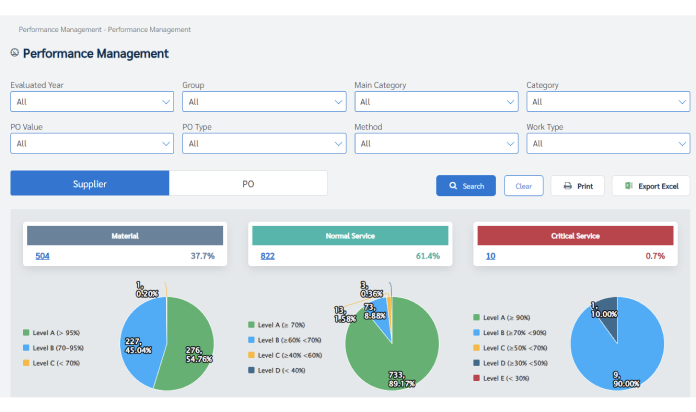
เมื่อจบงานในแต่ละสัญญาจัดซื้อจัดจ้าง ผู้ใช้งานจะทำการประเมินประสิทธิภาพของคู่ค้า ด้วยตัวชี้วัดทางด้านความปลอดภัย, ความยั่งยืน ESG และการปฏิบัติตามแนวทางปฏิบัติอย่างยั่งยืนของคู่ค้ากลุ่มไทยออยล์ (SCOC) และบันทึกลงในฐานข้อมูล


แนวทางการประเมิน ESG แบบ Desk Assessment

FY 2023 (numerical) | No. of Supplier – Passed the verification | Percentage – Passed the verification | |
|---|---|---|---|
Critical Suppliers | 37 | 32 | 86.49% |
Other Suppliers | 978 | 59 | 6.03% |
Grand Total | 91 | ||
High Risk Suppliers | – | – | – |
แนวทางการประเมิน ESG แบบ Desk Assessment



แนวทางการประเมิน ESG แบบ Desk Assessment

Number of significant supliers assessed via desk assessments/on-site assessments

Number of significant suppliers assessed and found potential negative impacts

Number of suppliers with potential negative impacts that were suspended

% of significant suppliers assessed

% of significant suppliers supported in CA implementation

Number of suppliers with potential negative impacts that were terminated
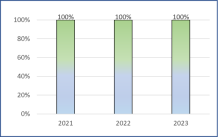
Suppliers Corrective Action Progress Number of significant supliers supported in CA implementation

Number of significant suppliers in capacity building programs

% of significant suppliers supported in CA implementation

% of significant suppliers in suppliers in capacity building programs
6.COMMUNICATE

Communicate the business plan to manage supplier relationships continuously.

Contractor Management : KOM with Contractor Management 2021

Contractor Management : KOM with Contractor Management 2022

Contractor Management : Management Site Walk at Labix Y2022

Contractor Management : Management Site Walk at TLB Y2022

Contractor Award 2020

Contractor Award 2022

Annual supplier conference 2019-2023
การสื่อสารวิสัยทัศน์ของบริษัทฯ ทิศทางการดำเนินงานจัดซื้อจัดจ้างกลุ่มไทยออยล์ รวมไปถึงการจัดการเชิงรุกทางด้าน
SSHE สิทธิมนุษยชนสำหรับคู่ค้า และการกำกับดูแลกิจการ ผ่านงานสัมมนาคู่ค้าประจำปี ในธีมงานเพื่อนแท้สู่ความยั่งยืน
(Partner For Life)

PTT Group CG Day

Regular Communicate COVID-19 measures

No Gift Policy Communication

Spending Analysis








